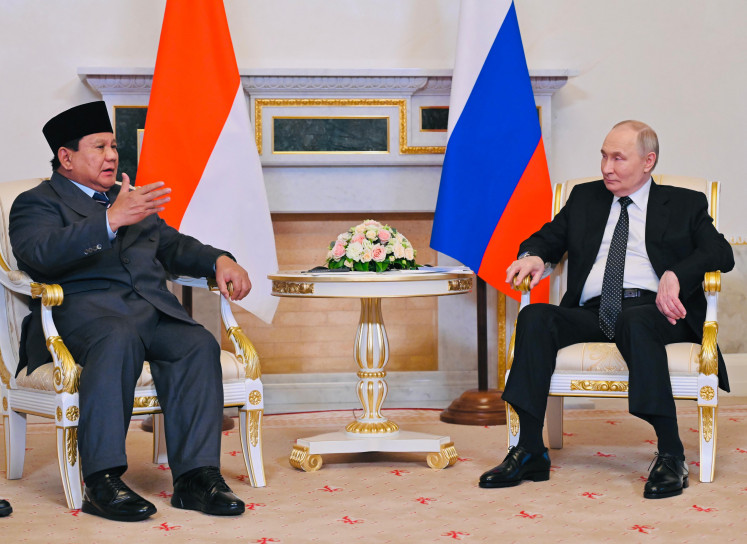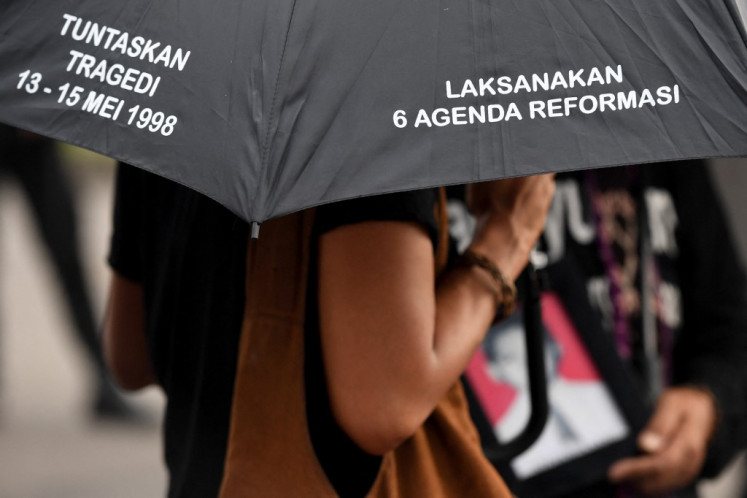Popular Reads
Top Results
Can't find what you're looking for?
View all search resultsPopular Reads
Top Results
Can't find what you're looking for?
View all search results`Ketoprak' seller taps into huge mobile phone user market
When street food vendor Toib, 41, ground peanuts, cut rice cakes and fried tofu, while sprinkling bean sprouts on a plate, he looked just like any other seller of Jakarta's famous ketoprak dish
Change text size
Gift Premium Articles
to Anyone

W
hen street food vendor Toib, 41, ground peanuts, cut rice cakes and fried tofu, while sprinkling bean sprouts on a plate, he looked just like any other seller of Jakarta's famous ketoprak dish.
But, another glance at his cart, which he parked in front of SMU 26 high school in Tebet, South Jakarta, revealed he was not your regular street food vendor.
The Central Javanese originating from Brebes displayed a collage of letters at the front of his cart, which read: "KETOPRAK.CELL". Hanging from the cart's ceiling was another sign: "Jual voucher" or "Sells vouchers".
He is not your regular ketoprak seller but rather a ketoprak-cum-prepaid cell phone credit vendor.
The sight of this street food vendor selling vouchers was such a rare sight for city observer Ardi Yunanto, who also happened to be the chief editor of online publication karbonjurnal.org, that he picked up on it.
On the journal's website, the picture of Toib's cart was displayed as the photo of the month.
The caption read: "Today, any-one can sell vouchers for mobile phone credit". The ketoprak vendor in Tebet, South Jakarta, even changed his cart's name to "Ketoprak.Cell".
Ardi said the novelty of Toib's enterprise made him take the picture. "This is the first time I see something like that. A ketoprak seller also selling vouchers," Ardi said.
Despite the novelty, Toib, or Tommy to his close customers, is a testament to how widespread the use of mobile phones in the city is, as even small sellers can tap into the market with little difficulty.
On a cloudy Wednesday, Toib was preparing ketoprak dishes for his customers. He said he started to sell mobile phone credit in 2007. The idea germinated after one of his customers asked him to buy mobile phone credit with his tips.
He then set out to be a dealer.
"I realized the interest on the Rp 1 million *around US$96* in my bank account was only Rp 5,000. I thought if I used that one million as capital for selling vouchers, I'd get more than that," he said.
So he went to mobile phone providers and bought electronic vouchers. For Telkomsel, he bought units from the company's M Kios program, while for Exelcom, he used Dompet Pulsa. He also has a multi-chip card than can be used to recharge any phone card.
Toib said he could get at least 30 transactions a day and make an extra Rp 800,000 to Rp 1 million a month.
More than half of Indonesia's population uses mobile phones. According to the Indonesian Telecommunications Regulatory Agency (BRTI) there are 150 million mobile phone users in Indonesia. This includes Global Satellite Mobile (GSM) and Code Division Multiple Access (CDMA) devices.
This significant market opportunity has not only been grabbed by Toib. Phone credit sellers can be found in any street warung in the city.
Even office workers see this as a business opportunity, selling phone credit to their colleagues as a side activity.
These vendors are part of the city's informal sector. Indonesia's informal sector, which encompasses millions of micro and small businesses, is renowned for its resilience that was tested and found true during the 1998 Asian financial crisis.
Like Toib, office worker Agung Wibowo has also been selling mobile phone credit for two years. He goes to the trading center in Roxy, Central Jakarta, and buys a multi-chip card to charge phone credit electronically.








